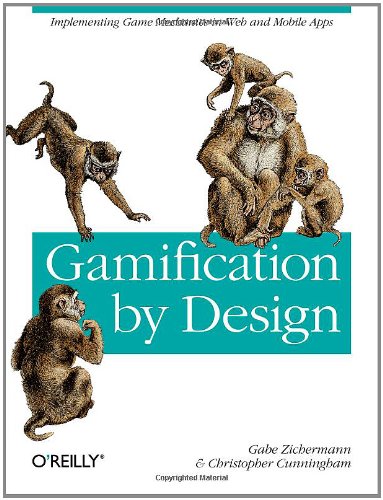I’ve been reading Gamification by Design by Zuckermann and Cunningham, and have just submitted a review to Amazon. I reproduce it here because I wanted to say a bit more about some ideas that sprang to mind after finishing this rather disappointing volume.
People enjoy computer games – therefore if you turn non-game things into games, everyone will be happy. That’s the idea, and that’s what this book is trying to tell you. But (and I guess you saw that BUT coming) the argument is not convincing. The authors describe in depth (and then in more depth) the techniques that games use (e.g points, levels, badges, power-ups) and then gives examples of non-game games that use these techniques. But (!) imho they are not very good examples. Take for, instance, Four Square: does it make me want to use (play?) it because it gives me quirky badges? Ok, to be fair I am not your typical gamer – I liked Lemmings and SimCity – but my thoughts on gamification are that it can be a powerful tool to engage people who are not your typical gamers, and I think this is where the book fails. The last 2 chapters, a tutorial on programming a points/badge website, are out of place here and would have been happier on the associated website.
Curiously, I expect books about games and gaming to be enjoyable reading; the reality is that they are all too often rather dull (A Theory of Fun being a notable exception). I’ve given the book 3 stars because it really made me start to think about what systems and processes could really benefit from gamification (Schools and the House of Lords! – not appropriate to expand here, but will do so in my LocoMatrix blog), though I think that would have happened if I had read a good article on the subject.
So two gamification ideas. The first is to do with schools and education. A Google search reveals (expectedly) that I am not the first by any means to write about it. What comes up in the search reveals that many writers have missed some or all of the points (and, of course, as with any buzzword there is a lot of bandwagon jumping going on). Missed point 1: turning a lesson into a game is likely to fail (not true of Invisible Buildings, I hope). Missed point 2; giving achievement badges etc probably going to fail, although come to think of it, house points worked well in my day.
No, my point is that the whole mechanics of learning could be made game-like. Take for example, the A level (or whatever exam you like). Two years learning and then you take the test. Your future depends on whether you pass or fail (or even that you pass with a star – hey, that’s gamification – or perhaps not). Far better – you learn something, may be over a day or a week, you do something to show you understand it – you go “up a level”. Going up a level may just take you to the next stage in a subject or it may allow you to move sideways within the subject. Or you may choose to stop there and do something else.
Your argument may be that how will that work within the class and with the teacher – my argument would be: how do teachers and classes fit within the game plan? I will have more to say on this at a later date.
My second gamification idea revolves around bicameral government. Reasonable people realise the need to reform/abolish the House of Lords but what do you replace it with. A second elected chamber which will either reflect the views of the Commons, or completely obstruct it if majority is held by another party. So what really is the point?
So is there some merit in having a second house based, not on election, but on merit? In a way, like life peers, except not for life and not chosen by the government – maybe more like those chosen for OBEs etc (hey, badges!), except not chosen by the government. Yes, maybe, the new house would be made up of those who play the “game” and then, er… “win”.
This could be expanded to have a second “house” at local government level – made up from local “players”. And then maybe it’s the local players who go on to elect the national players.
Just a thought (and maybe something we can refine – perhaps by creating the “game”)

In sympathy with much of your article. But surely the right way to fix the ‘House of Lords’ is with sortition – a randomly selected chamber, chosen from the whole population. It’s what we do with juries, and what the ancient Athenians saw as an essential part of democracy, so that it was rule by the people, not just on behalf of the people. Any argument against this is really an argument against democracy as a principle.
(just getting round to comments after major/temporary changes to website) – Jeremy, you may well be right but what are the chances of your fix happening? A ground-up approach that doesn’t require laws or politicians may prove more practical